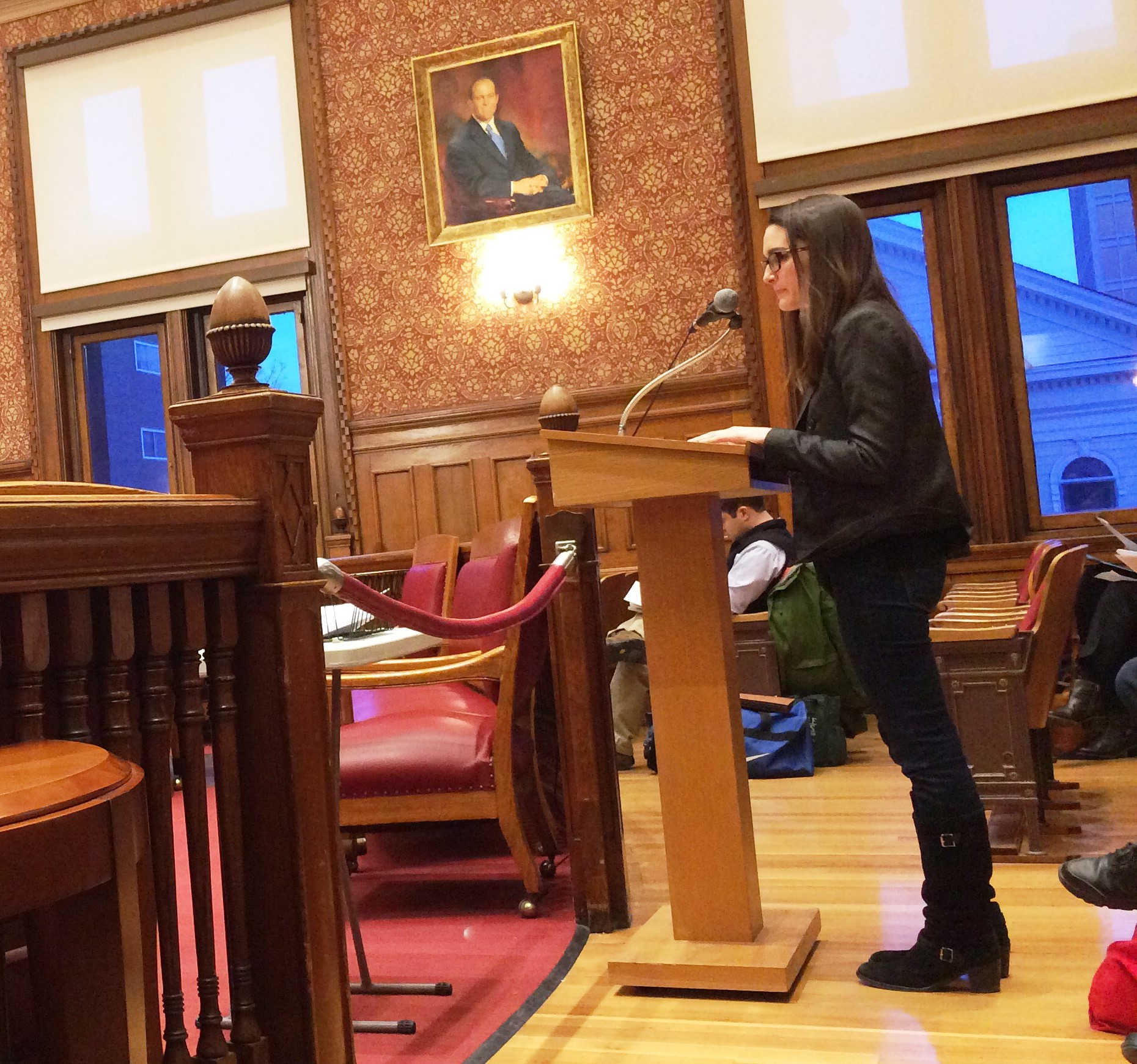
Posted by Kim Quarantello
As a former Capitol Hill staffer, I was accustomed to drafting talking points. For nearly three years, I wrote “TPs” on foreign policy, defense, and veterans’ issues, including my boss’ favorite vocabulary words so that his voice would come through in press conferences and Senate hearings.

Kim Quarantello, a member of HIRC’s Immigration Response Initiative, speaking at a Cambridge City Council meeting.
But I’d never written talking points to deliver myself until last month, when I stood up at a Cambridge City Council meeting and urged Massachusetts to end its partnership with Immigration and Customs Enforcement.
Since I became a graduate student at the Harvard Center for Middle Eastern Studies, I’ve been particularly involved in immigration issues. I started tutoring at the Harvard Bridge Program, which provides English language support to Harvard employees, most of whom are immigrants. I analyzed proposals to enhance resettlement processing and interagency cooperation for HIRC’s Syrian Resettlement Project. I also coordinated events that connected recently resettled Syrian refugees in Lowell with American students studying Arabic at Harvard.
But I never expected to put my legislative advocacy skills to work in academia until the presidential election, when immigration issues changed overnight. Along with more than 300 students at Harvard Law School, I joined the Immigration Response Initiative, volunteering to help HIRC and advocacy groups. Another former Capitol Hill staffer, Annika Lichtenbaum, and I decided to form the legislative advocacy team.
First, we analyzed harmful immigration and refugee bills from the 114th Congress that would introduce procedural barriers and restrict government funding for legal counsel, sharing our analysis with a national network of law professors and immigration advocates.
Then, in advance of Jeff Sessions’ Attorney General confirmation hearing, we prepared questions for Diane Feinstein, the Ranking Member of the Senate Judiciary Committee. Our questions focused on the National Security Entry-Exit Registration System (NSEERS), a registration process implemented after 9/11 that targeted visitors from Muslim-majority countries, which we feared would be reintroduced. We also coordinated the Harvard Students Against Jeff Sessions virtual phone bank to oppose his confirmation.
We could certainly do more with a wider base of support from students. But despite many opportunities to engage, it has been challenging to demonstrate the importance of legislative advocacy to future attorneys. When we held our first meeting–admittedly during finals week–only three other students attended.
I understand the lack of enthusiasm for this type of work. “Know Your Rights” events and DACA clinics promise more personal and immediate connections with the communities we fight to protect. Marching against the Muslim ban is not only effective in drawing media attention, but also a cathartic and inspiring way to voice your opposition. By comparison, it’s less energizing to sit alone in front of your computer, drafting carefully curated policy arguments, hoping an elected official–or a staffer–might eventually read what you have to say.
And demonstrating the tangible impact of legislative advocacy certainly isn’t easy, particularly given the breathtaking speed with which President Trump has issued executive orders. Some of our efforts this semester have felt futile.
But I’ve seen first-hand the impact of constituent lobbying on the decisions and actions of our elected officials. I know how much staffers rely on policy advocates to educate them as they sort through the pros and cons of pending legislation on behalf of elected officials.
Legislative advocacy has a critical role to play in the resistance. It supports the public servants who are pushing back against the policies that will hurt American communities, especially immigrants and refugees. It leaves a public trail of opposition important not only for history books, but for the prospects of future policy change. If nothing else, it teaches an understanding of how government works—an understanding that is critical for anyone who seeks to change it.
Anyone doubting the power of legislative advocacy would do well to look to local politics, where advocates have made great strides. Cambridge City Council Members unanimously passed the resolution we championed with other community advocates at the public comment period, urging Governor Baker to withdraw from a program that undermines trust in law enforcement agencies, threatens community safety, and employs racial profiling.
We may not always successfully change policy, but one thing is clear: We would lose far more legislative battles if we never bothered to fight.